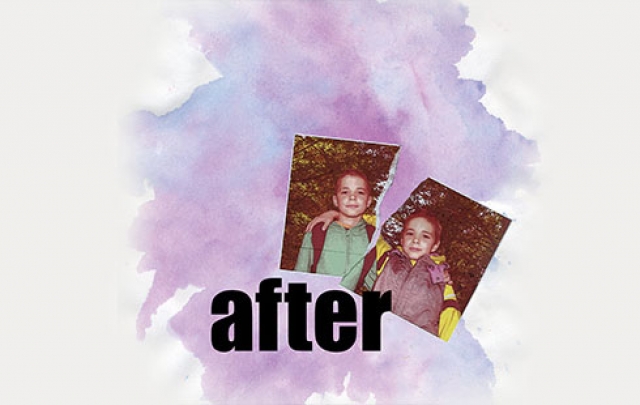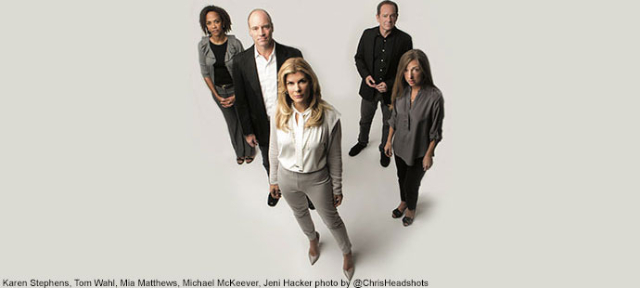After by Michael McKeever
World Premiere at Miami's Adrienne Arsht Center
By: Aaron Kraus - Nov 12, 2016
“Now what?!”
The uncomfortably-spoken words hover disturbingly in the air as though the speaker’s future shroud hung above her.
“Now what” are the words we don’t hear after the sadness, shock and horror caused by school shootings and bullying-related suicides have subsided…and the lives of the immediately-affected families are forever changed.
“Now what” are the words playwright Michael McKeever wants us to ponder after watching his devastatingly honest, explosive, unflinching and all-too-topical play titled simply “After.”
The play gives us more than a glimpse into the broken souls of the affected families.
What is “normal” supposed to feel like for these people?
You can almost hear newspaper pages ripping as you watch the intense, heartbreaking and powerfully-acted world premiere production of McKeever’s play. If you hear those sounds, it’s because the topics in McKeever’s compelling play come torn right from today’s headlines above stories about school bullying, related suicides and shootings.
The play is on-stage through November 13 in a superb production by Miami’s Zoetic Stage.
Performances take place in the intimate Susan Westfall Playwrights Stage space, a black box-like theater whose dark interior perfectly reinforces the serious themes in “After.”
The sound of someone ripping a newspaper doesn’t nearly evoke the piercing, ear-splitting shrill of the survivors’ lives being smashed and shattered into tatters.
In Zoetic’s production, that shrill is deafening, thanks to top-notch performances by a marvelous cast, led by the skillful, sensitive direction of Stuart Meltzer.
“After” is the type of high-caliber work we’ve come to expect from McKeever, an internationally-produced, multi-award-winning, prolific playwright who co-founded the award-winning Zoetic Stage. McKeever, also a multi award-winning actor, co-stars in “After,” an ensemble piece that doesn’t offer easy answers.
In “After,” McKeever doesn’t ask us to merely pity the characters and he doesn’t place blame squarely on anyone. He wants us to stop and think about how senseless, despicable acts not only can take lives, but leave those left behind reeling…perhaps for the rest of their lives.
“After” is the kind of play people need to see in the wake of a tragedy such as the Dec. 14. 2012 Sandy Hook Elementary School massacre. It left 20 children, ages 6 and 7, as well as six adult staff members dead. “Wake up!” seems to be McKeever’s admonition to lawmakers, school officials and others. “How many more lives need to be torn apart by such senseless violence before action is taken?”
“After” is deftly constructed. It is divided into three sections: The first part revolves around what happens before the deadly violence, the second part takes place during the violence (which we don’t see) and the final part shows us what happens in the aftermath of it all.
We learn in the beginning that a high school student has received a text, which includes a hurtful word to describe gay people. “You’re next,” the message continues.
Is the text a harbinger of a deadly act to come? What does the implied threat mean? Is it anything to be seriously concerned about? Was the punishment the principal meted out sufficient, or did the perpetrator’s actions call for a harsher penalty?
It depends on which set of characters you ask.
Tension is thick and tempers flare, but McKeever builds up to that point in a low-key manner, with wry humor sprinkled in. The parents of the victim visit the bully’s parents, and the obviously perturbed mother notes that a deer’s head is mounted on the wall of the latter family’s fancy home.
“I’m…mesmerized by the decorations on the wall,” she says with bitter sarcasm. “It’s barbaric.”
McKeever’s writing is admirably clever. For instance, the bully’s mother comments that the deer’s head is the kind of object that makes its presence felt even if a visitor chooses to ignore it. McKeever might be trying to draw a parallel between the mounted deer’s head and bullying/violence. You can pretend it doesn’t exist…but that doesn’t mean it doesn’t happen and will eventually force you to acknowledge it, even as you’re in denial.
His script is also unpredictable; an incident with a gun involving the adults will no doubt catch you off guard. The playwright deftly illustrates a point through this incident.
At this time, the grown-ups are talking over each other. Tempers are flaring and the adults aren’t acting like adults. We feel as though we’re watching the play “God of Carnage.” The play, by Yasmina Reza, also deals with an act of bullying, with both sets of parents (those of the bullied and the bully) meeting to talk out the situation in a civilized manner. It devolves into chaos as the “adults” act increasingly childish and then destructive.
While both plays are about bullying, “After” is a deeper work, asking us to consider, for instance, the role of parents in general and their culpability in bullying.
Each of the five performers shine in their roles, into which they’ve disappeared. The intensity of each performance never feels forced, but seems to have grown organically from the actors developing their characters.
The convincing performances are also blessed with nuance and powerfully emotional moments, including sobs that sound authentic. No one actor tries to dominate the proceedings to the point of upstaging their cast mates. That’s important, since “After” is an ensemble piece.
Under Meltzer’s astute direction, quiet scenes, some laid-back, some tension-filled, are contrasted with the loud, hostile moments.
Individual performances also offer contrast. In the beginning, Jeni Hacker, bearing almost a pallid facial expression, suggests her character, the mother of the bullied boy, is wiped out from unbearable emotional pain. But Hacker is high-strung, and when it comes time for the character to unleash her venom, Hacker energetically conveys palpable contempt and bitterness.
Mia Matthews, as the mother of the bully, has a charm and easy going manner in the beginning, suggesting a life of privilege and contentment. But Matthews also proves adept at intensifying emotions without overdoing it.
The others, including McKeever’s fiery Alan Beckman, Tom Wahl’s more reserved but still edgy Tate Campbell, shine, as does Karen Stephens. The latter plays a friend of the families who serves as a sort of mediator, a reasoning woman trying to keep the peace. Campell, who also packs a palpable emotional punch into her production, seamlessly alternates between a calming aura and an exasperated feeling of not being able to control the bickering adults.
The program notes that the play takes place in “Suburban America,” suggesting that actions such as those in the play can – and do – happen anywhere.
More specifically, the play is set in the Campbell household, designed elegantly by Michael McClain, suggesting an upscale, spacious home. It’s a handsome, realistic set that provides plenty of space for the actors to move, while including details such as pieces of art, plants and a makeshift “bar.”
The home’s interior is grey and black, reinforcing the darkness of the issues raised by the play and the seriousness of the deeds described in the work.
With “After,” McKeever, a diverse South Florida-based playwright who combines insight and sharp humor with smart writing, has penned a play that’s essential viewing for everybody.
Theater can’t solve all the world’s problems, but it can shine a light on them, possibly leading to action and healing.
“After” is a perfect example of such theater.
The play will likely enjoy a long theatrical life – including a Broadway run.
“After”
Through November 13
Performances at 7:30 p.m. today and Saturday as well as 4 p.m. Sunday.
Adrienne Arsht Center
1300 Biscayne Blvd., Miami.
For tickets, call (305) 949-6722.


